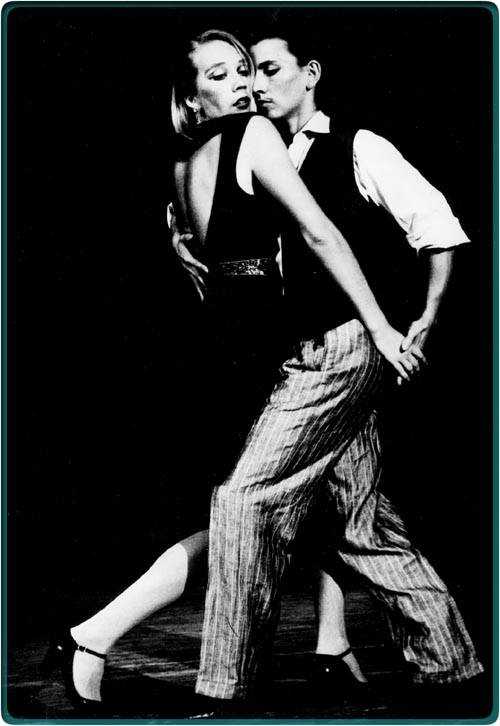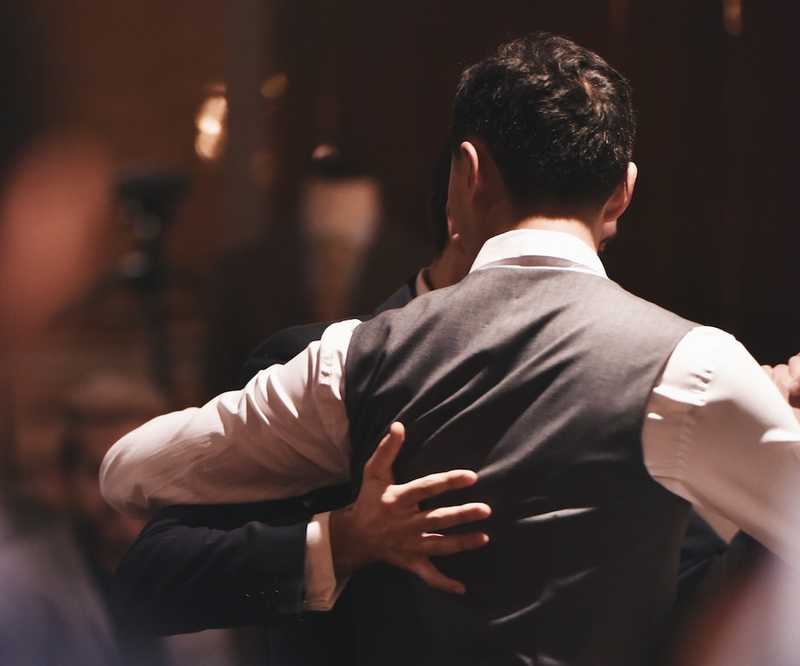So you want to "help" queers learn tango...
I've been leading Argentine tango for about five years now. In the two years since I reached an intermediate level, I've been approached twice by straight instructors who tell me they want to "help" queers learn tango. What does this really mean? It means that, knowing little to nothing about queers, they see the buzz around "queer tango" and would like to make some money off it. Lacking queerness, they want me to buy in, lend my caché to their project and, ostensibly, help queers to "feel more comfortable" coming to their lessons.
It should be noted that there are also a lot of very good straight and queer instructors in a lot of places who offer "open role" lessons (which usually means, in case you are queer and/or haven't yet learned to tango that you are in lessons with straight people but you can choose to lead or follow, rather than your role being determined by your gender). If open role is what's available to you as a queer person who wants to learn tango, go! Look for instructors who are detailed and helpful and respectful. And thank you to all the instructors currently welcoming LGBTQ students at their open role lessons.
But many queers, in particular queer women, want more than to attend open role lessons and dance with straight people. Many queers want to learn with, build community with, and dance with queers. And open role, let's be honest, is not queer tango. What you can't get at an open role lesson is a sensitivity to the sexual orientations, sexual practices, gender politics, and gender identities of queers. You can't really offer this if you're not queer, and you can't really offer this if the majority of students in the lesson are straight. Here are some points to ponder:
- Queer women come to queer spaces expecting not to be objectfied by men. Now, I know some very decent, respectful tango leads, but that is not something you can across-the-board expect at a straight open role lesson. Much less a milonga.
- Genderqueer and trans individuals come to queer spaces expecting to have their gender identities recognized and honored. While trans visibility has done a great deal of trailblazing in this regard, I would not in my wildest dreams expect a room full of 60- and 70-year old straight tango students to handle one or more custom pronouns with panache. Even if you can do it, some of your students probably can't.
- Queers have on average more (much more) sexual and relational trauma. Most of us, especially those of us over 40, have been verbally or physically assaulted at some point because of our looks, our identity, or our orientation. Which means that we have a "special" relationship with touch. Many queer women simply do not want to be touched by men. They may not even be comfortable switching partners and being touched by other women. This is, in my opinion, a huge unspoken barrier for queer tango.
- "Lead" and "follow" are gender-neutral. You do not need to invent some sort of alternative. Just avoid referring to leads as he/him/men/niños/chicos and follows as she/her/women/niñas/chicas and you're golden. Queers invented power play, kink, and sex roles and employ a panoply of gender neutral labels to communicate these various situations (top and bottom, dom and sub, butch and femme, bear and cub, I could go on). The use of "lead" and "follow" will therefore make perfect sense to queers.
- Queers don't make that much money. Because of Modern Family you straight people think we are loaded. And yes, there are the lawyer/doctor gay male DINK couples falling all over themselves to adopt. But a lesbian couple's got the glass ceiling times two. And a whole lot of queers were at an economic and educational disadvantage in early adulthood because we were rejected by our families. It adds up. If you're going to teach queers, and in particular queer women, you're not going to make bank and you shouldn't expect to.
- Queer community activities have historically had an altruistic and activist bent because we are a minority population. All queer events inherit to some degree this long legacy of activism, networking, and care for one another. This means that if you open a gay bar, start a queer scholarship, or even just host a potluck, you invoke the ethical underpinnings of Stonewall, ACT UP, the Combahee River Collective, and the Radical Faeries. While some would argue that the legalization of gay marriage and rifts within the community over trans visibility have degraded this altruistic and activist culture to some extent, anything you offer that has the label "queer" is understood to be a service to the queer community. If you approach it strictly as a business venture you will ultimately come off as a tool.
If you didn't know these things already, you shouldn't be teaching queer tango.
What can you do to avoid this kind of situation? To avoid looking (whatever your intent) like you're trying to make a buck off of queers?
- Don't try to pass yourself off as queer or queer-literate. (Don't for example, be that straight guy who goes on about his "fluid sexuality." Don't, in particular, so expostulate after objectifying or hitting on queer women in your classes.) Practice humility and integrity. I bet you didn't go around claiming to be an expert dancer when you were a beginner. You're never going to be an expert in queerness because you're a straight person. Who wants to advocate for queer tango. That's enough. Really. It is.
- Don't "invite" queer dancers to "collaborate" in order to give your lessons queer bona-fide. If they're any good, they've paid the price for their queerness on the tango scene. They've broken barriers on their own. And they've been paying the price everywhere else as well—all their lives. You do not get to breeze in and use someone else's hard-won identity to bring in customers. If you think they're good, then help them be the best instructor they can be (see below).
- Do encourage talented queer dancers to teach:
- Help them find affordable spaces for lessons and milongas (that double glass ceiling means you can't charge a ton for lessons).
- Help them get connected to others in the community, including visiting instructors and known event coordinators.
- Help them get connected to funding. As I've mentioned above, double glass ceiling. This is a no-brainer and it will mean more queer tangueros and tangueras eventually find their way to the straight scene.
- Offer to mentor talented queer dancers in tango instruction. The point is to grow talent in the queer community, not make money off of queers.
- Spread the word, and hold your fellow instructors to these same standards.
That's all. Simple, right? Onward! We appreciate it.
Image Credits
- "Brigitta Winkler and Agelika[?] dance tango in the 1980s", Queer Tango Archive
- Photo by 7 SeTh on Unsplash

